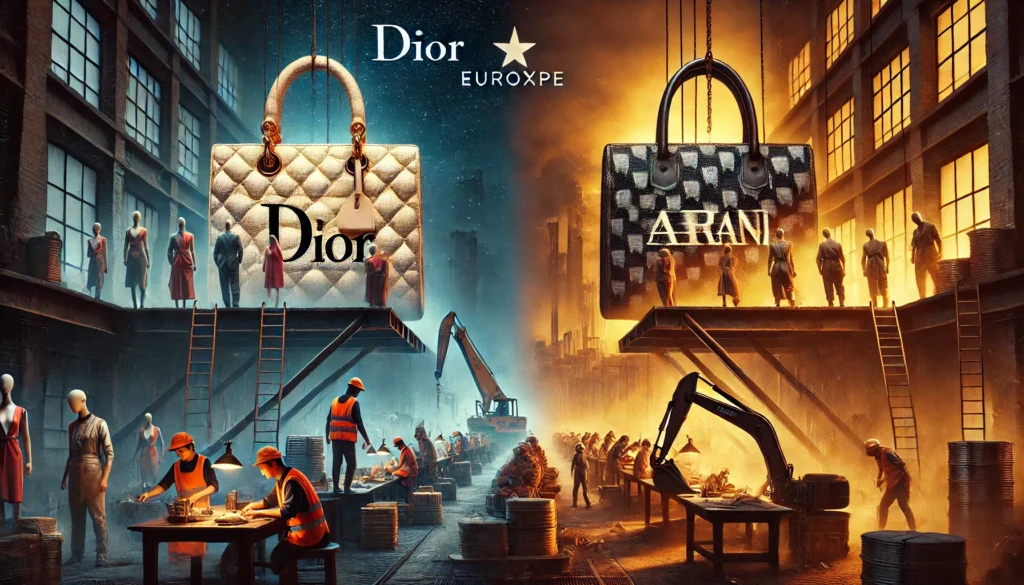Recent investigations have unveiled a scandal involving renowned luxury brands Dior and Armani, who stand accused of exploiting labour in Italy. The revelations highlight the disparity between the opulence of Milan’s fashion scene and the grim conditions under which luxury goods are produced.
A series of raids conducted in Italy has brought to light significant discrepancies in the production processes of luxury items. Reports by the Wall Street Journal indicate that Milan prosecutors have found evidence of foreign labour exploitation in local factories that manufacture handbags and leather goods for Dior and Armani. These findings expose the stark contrast between the glamorous world of high fashion and the harsh realities of its production.
Documents reviewed during the investigation reveal shocking details about the payments made by these luxury brands to their suppliers. Dior is reported to pay a mere €53 per handbag, which is later sold in stores for €2,600. Similarly, Armani purchases its bags from suppliers at €93 and resells them to the brand for €250, with the final retail price around €1,800. These figures exclude additional expenses for materials such as leather, design, distribution, and marketing, highlighting the substantial markups involved.
The investigation further reveals that these Italian factories also produce goods for other prominent fashion labels, raising concerns about widespread issues within the industry. Prosecutors have criticized these luxury companies for failing to oversee their supply chains adequately. However, despite the damning findings, the companies themselves do not currently face charges. Instead, some of the independently owned suppliers may face legal consequences for worker exploitation and employing undocumented workers.
Dior, owned by luxury giant LVMH, has refrained from commenting on the report. In contrast, Armani has stated that it has “control and prevention measures in place to minimize abuses in the supply chain” and is “collaborating with the utmost transparency” with authorities. This response, as reported by the Wall Street Journal, indicates an attempt to mitigate the damage and address the concerns raised by the investigation.
According to consulting firm Bain, Italy remains a crucial hub for producing luxury clothing and leather goods, contributing to 50-55% of the global output. This context underscores the broader significance of the investigation’s findings, which not only implicate Dior and Armani but also suggest systemic issues within the luxury fashion industry in Italy.
In response to these revelations, judicial measures have been taken against companies like Manufactures Dior SRL and Armani, placing them under court administration. This legal intervention, typically reserved for companies infiltrated by organized crime, aims to oversee operations and ensure progress in resolving the issues. Additionally, Alviero Martini, another implicated brand, expressed surprise and concern over findings that some of its suppliers had illicitly subcontracted production without its knowledge, highlighting the complexities of the sector’s production chains.
The court ruling on Dior focused on four Milan-area companies in the supply chain, two of which directly supplied the brand. These workshops employed dozens of workers, including at least two illegal immigrants and seven who were employed off the books. The conditions in these workshops were described as “below the minimum required by an ethical approach,” with workers operating machines from which safety devices had been removed to increase productivity, compromising their safety. Moreover, some workers lived at the workshop, with data indicating that they typically worked from dawn until after 9 p.m., including weekends and holidays.
The ruling against Armani revealed that one of its subsidiaries, GA Operations, hired two subcontractors who in turn employed several Chinese-owned subcontractors in Italy. Workers interviewed during the investigation reported being paid as little as 2 to 3 euros an hour to work long days, significantly lower than the sector’s collective bargaining agreements.
These revelations call for urgent reforms and heightened oversight within the luxury fashion industry to ensure ethical practices and the protection of workers’ rights.


